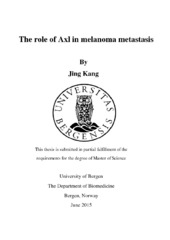| dc.description.abstract | Melanoma is a highly invasive and metastatic cancer, thus understanding the mechanism of melanoma metastasis is a major issue. In our study, the objective is to elucidate the role of the receptor tyrosine kinase Axl in metastatic melanoma. The central hypothesis is that Axl affects melanoma metastasis via activation of Akt3. We demonstrated that among our six New Zealand Melanoma cell lines, cells with higher expression of Axl have higher levels of proliferation, migration and invasion; Cells with higher expression of Akt3 also have higher abilities of proliferation and migration, but have the lowest invasion ability without co-expression of Axl. We found that cells kept in normal incubator and in low oxygen incubator (5% O2) show different proliferation and invasion abilities, but similar migration level. We are currently using CRISPR-Cas9 system to permanently knock out the Axl gene in the melanoma cell lines to elucidate how Axl signaling contributes melanoma metastasis via Akt3. In conclusion, these results support new therapeutic approaches based on Axl signaling inhibition to treat metastatic melanoma. | en_US |
